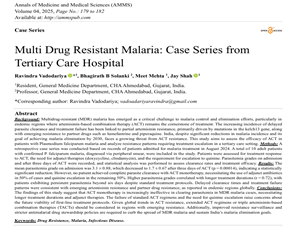##plugins.themes.bootstrap3.article.main##
Abstract
Background: Multidrug-resistant (MDR) malaria has emerged as a critical challenge to malaria control and elimination efforts, particularly in endemic regions where artemisinin-based combination therapy (ACT) remains the cornerstone of treatment. The increasing incidence of delayed parasite clearance and treatment failure has been linked to partial artemisinin resistance, primarily driven by mutations in the kelch13 gene, along with emerging resistance to partner drugs such as lumefantrine and piperaquine. India, despite significant reductions in malaria incidence and its goal of achieving malaria elimination by 2030, faces a growing threat from ACT resistance. This study aims to assess the efficacy of ACT in patients with Plasmodium falciparum malaria and analyze resistance patterns requiring treatment escalation in a tertiary care setting. Methods: A retrospective case series was conducted based on records of patients admitted for malaria treatment in August 2024. A total of 10 adult patients with confirmed P. falciparum malaria, diagnosed via peripheral smear, were included in the study. Patients were assessed for treatment response to ACT, the need for adjunct therapies (doxycycline, clindamycin), and the requirement for escalation to quinine. Parasitemia grades on admission and after three days of ACT were recorded, and statistical analysis was performed to assess clearance rates and treatment efficacy. Results: The mean parasitemia grade on admission was 3.1 ± 0.88, which decreased to 1.7 ± 0.67 after three days of ACT (p = 0.00014), indicating a statistically significant reduction. However, no patient achieved complete parasite clearance with ACT monotherapy, necessitating the use of adjunct antibiotics in 50% of cases and quinine escalation in the remaining 50%. Higher parasitemia grades correlated with longer treatment durations (r = 0.72), with patients exhibiting persistent parasitemia beyond six days despite standard treatment protocols. Delayed clearance times and treatment failure patterns were consistent with emerging artemisinin resistance and partner drug resistance, as reported in endemic regions globally. Conclusions: The findings of this study suggest that ACT monotherapy is increasingly ineffective in clearing parasitemia in MDR malaria cases, necessitating longer treatment durations and adjunct therapies. The failure of standard ACT regimens and the need for quinine escalation raise concerns about the future viability of first-line treatment protocols. Given global trends in ACT resistance, extended ACT regimens or triple artemisinin-based combination therapies (TACTs) should be considered in regions with emerging resistance. Additionally, improved resistance surveillance and stricter antimalarial drug stewardship policies are required to curb the spread of MDR malaria and sustain India’s malaria elimination goals.
##plugins.themes.bootstrap3.article.details##
Copyright (c) 2025 Ravindra Vadodariya, Bhagirath B Solanki, Meet Mehta, Jay Shah

This work is licensed under a Creative Commons Attribution 4.0 International License.
Creative Commons License All articles published in Annals of Medicine and Medical Sciences are licensed under a Creative Commons Attribution 4.0 International License.
[1] Miller, L. H., Ackerman, H. C., Su, X. Z. & Wellems, T. E. Malaria biology and disease pathogenesis: insights for new treatments. Nat. Med. 19, 156–167 (2013).
[2] White, N. J. et al. Malaria. Lancet 383, 723–735 (2014).
[3] Cowman, A. F., Healer, J., Marapana, D. & Marsh, K. Malaria: biology and disease. Cell 167, 610–624 (2016). References 1–3 comprehensively review malaria biology and the disease.
[4] NVDCP guidelines for malaria, 2023-2027, MOHFW
[5] Wassmer, S. C. et al. Investigating the pathogenesis of severe malaria: a multidisciplinary and cross geographical approach. Am. J. Trop. Med. Hyg. 93, 42–56 (2015)
[6] World Health Organization. Severe malaria. Trop. Med. Int. Health 19 (Suppl. 1), 7–131 (2014).
[7] Woodrow, C. J. & White, N. J. The clinical impact of artemisinin resistance in Southeast Asia and the potential for future spread. FEMS Microbiol. Rev. 41, 34–48 (2017).
[8] World Health Organization. Malaria Treatment. Trop. Med. Int. Health 22 (suppl. 2) 8-23.
[9] White, N. J. Does antimalarial mass drug administration increase or decrease the risk of resistance? Lancet Infect. Dis. 17, e15-e20 (2017).
[10] Amato, R. et al. Genetic markers associated with dihydroartemisinin piperaquine failure in Plasmodium falciparum malaria: a genotype phenotype association study. Lancet Infect. Dis. 17, 164-173 (2017).

